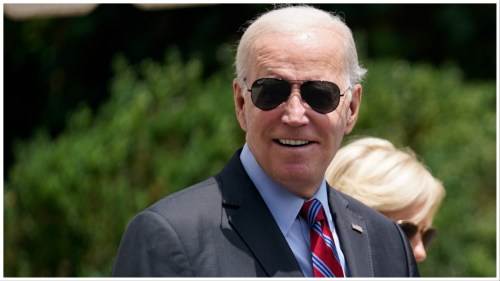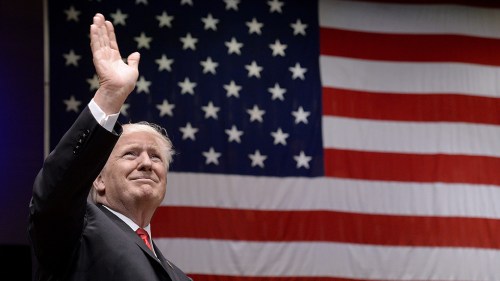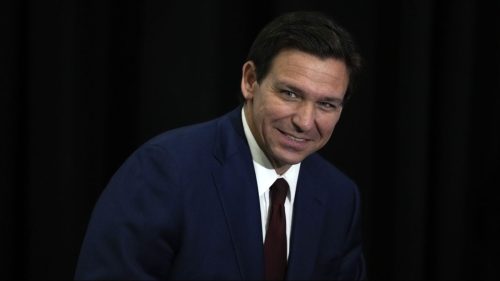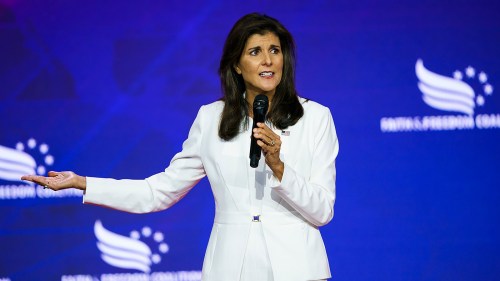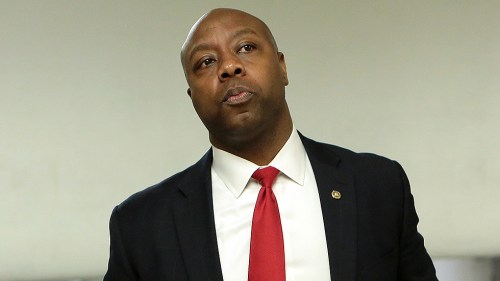Black women seek to bring change to GOP

A new generation of Black women is seeking to bring change and diversity to the GOP as the party looks to broaden its appeal with constituencies that have long shunned it.
While Black women have made history in numerous political areas over the last four years — including Vice President Harris, Supreme Court Justice Ketanji Brown Jackson and Sen. Laphonza Butler — most have been aligned with the Democratic Party.
But in recent years, Black women have increasingly made inroads in the Republican Party, signaling a possible shift in the makeup of a party grappling with weaknesses among female voters and voters of color.
“I looked at the Republican Party maybe how Frederick Douglass looked at the Republican Party,” said Kimberly Klacik, currently a candidate in Maryland’s 2nd Congressional District.
“The way the Democratic Party works, the way the system is, I just can’t get on board with it,” said Klacik, who previously ran in the state’s 7th district. “I think there’s much more freedom in the Republican Party.”
According to a recent Gallup survey, Democrats’ lead over Republicans in Black Americans’ party preferences has dropped by almost 20 points over the last three years. And a December survey from GenForward found that if the election were held today, 17 percent of Black voters would vote for former president Donald Trump.
Meanwhile, the party has struggled with female voters, especially in the wake of the overturning of Roe v. Wade. On Tuesday, the Arizona Supreme Court upheld an 1864 law effectively banning the procedure in the state, underscoring the degree to which reproductive rights — a critical issue for female voters — will dominate political discourse heading into November.
Black female Republicans see an opportunity to reshape those perceptions of the party and help it appeal to both voters of color and women voters, two groups that will be pivotal in November.
Janiyah Thomas, media relations director for the Republican National Convention, said many Black women have begun to feel disconnected from the Democratic Party.
“Democrat policies have consistently sidelined the concerns and needs of Black Americans,” said Thomas, a former media relations director for South Carolina Sen. Tim Scott’s presidential campaign.
Still, Congress hasn’t seen a Black Republican woman since former Rep. Mia Love (Utah), the first Black Republican woman to serve in Congress. Love held office from 2015 to 2019.
Since then, Black Republican women have seen occasional successes elsewhere. In 2021, Winsome Sears was elected Virginia’s lieutenant governor, making her the commonwealth’s first woman to hold that position, as well as the first Black woman to hold statewide elected office there.
Still, Democrats have long held the advantage when it comes to representation among Black female leaders. There are currently 29 Black women serving in Congress alone, according to the Center for American Women and Politics.
But polls show Black women growing increasingly concerned with the direction the country is headed, with the cost of living, public safety, and racism and discrimination as some of their top issues ahead of November’s election.
Brian Seitchick, a Republican strategist, said these issues, paired with failed campaign pledges by Democrats like Biden, have spurred many Black Americans to grow “Republican-curious.”
“I have seen more African Americans at GOP events in recent years,” Seitchik, a former Trump campaign consultant, told The Hill. In part, he added, because some of the former president’s policies appealed to Black Americans.
“They liked the economy, they liked that he cut regulations and empowered businesses and entrepreneurs,” Seitchik said. “I think Black voters, Black women, who have felt taken for granted, are troubled by these niche policies shamelessly geared towards trying to earn their vote on the short term without doing anything on the long term. And I think they see Trump’s policies, even if they don’t like him personally, as more beneficial to them in the long term.”
Some Black Republican women have been inspired to run for office after feeling like they weren’t represented in government.
In November 2019, Roxy Ndebumadu became the youngest woman elected to serve on the Bowie City Council and the first African American woman to represent Maryland’s District 4. She was reelected to a second term last November.
“When I reflect on the way that I grew up — as a Black woman, as a first-generation American and daughter of Nigerian immigrant parents — I have to reflect and remember what values were important to us and the values that I was raised with,” Ndebumadu told The Hill.
These values, Ndebumadu added, almost always aligned with the Republican Party, though she doesn’t always agree with it.
“The inception and the premise and the boundaries of what the Republican Party was founded on are synonymous with the values that I was raised with and that I hold near and dear to my heart,” she said.
But Ndebumadu acknowledges the makeup of the current Republican Party can be seen as troubling.
“I think in order to have more women, specifically Black women, run for office in the Republican Party, we need to set mechanisms in place to make sure that they are protected once they get there,” Ndebumadu said. “I have been elected going on five years now. I have been the target of almost every attack of my city council — every single one — but do you think there’s a party sustaining me or pouring into me? Quite frankly, no.”
Ndebumadu added that the GOP needs to undergo structural change that will support diversity.
“In order for the Republican Party to have more Black women run for office,” she added, “we need programs and things in place to sustain Black women in office to make sure that when they do good work for their community, it’s out there and it is being shared with the masses so that people can see the type of leadership that is coming out of the Republican Party.”
But recruiting more Black women could be challenging for the GOP, which has come under fire in recent months for what some have called “anti-Black” rhetoric and policy.
From attempts to limit Black history in schools to restrictions on diversity, equity and inclusion programs, Democrats and Black leaders alike have argued the Republican Party is hurting Black Americans.
These issues, Democrats argue, go all the way up to the head of the Republican Party.
In February, Trump faced heavy criticism from Black leaders for saying that his legal woes have earned him the support of Black voters around the country, that Black Americans “embraced” his mug shot and that he knows Black people because they built his buildings.
Klacik, the congressional candidate in Maryland, acknowledged that national issues do affect her ability to connect with potential constituents.
“I have a lot of people say, ‘I think you’re gonna vote to ban abortions and you’re gonna vote this way,’” said Klacik. “There’s a big conversation about Republicans wanting to end Social Security. I would never want to end Social Security. People believe certain things, possibly because of the media or what they’ve been told, but I just want people to know I will never turn my back on the Black community.”
Klacik gained national attention in 2020, when she was running in the 7th district, with a viral video showing her walking through a dilapidated section of Baltimore. In the video, Klacik criticized Democratic leaders, hitting the party over crime and calls to “defund the police.”
“The reason I ran is because of all the things that I’ve been seeing going on in the Black community,” Klacik told The Hill. “I just know that we could do better. We have the potential to really thrive. We just have to get more people in the fold.”
Klacik also said there were barriers for all women running for office — regardless of party.
“Oftentimes, even talking to people within my own party, people will say, ‘Well, I think women would vote emotionally so what can you do to make sure that you can convince us to you’re not gonna vote based on your emotions,’” Klacik said. “It’s like, alright, I understand where you’re coming from, but not all women are emotionally driven. Any of us can separate work from our emotions, just like men can.”
With Scott and Rep. Byron Donalds (R-Fla.) being floated as potential running mates for former President Trump, some say this may encourage more Black voters, including women, to consider what the Republican Party can offer them.
“Black women see an opportunity to reclaim the Republican Party as our own, recognizing that our ancestors were instrumental in co-founding the party during the Reconstruction era,” Thomas said.
Thomas is certain that if the Republican Party can invest in Black women more, the nation could see the entire Party makeup change.
“As someone who has been actively involved in the Republican Party, I believe that our experiences are a source of inspiration and empowerment for Black women who are eager to make a difference in creating policies that uplift our community and families,” Thomas said.
Tiah Shepherd contributed to this article.
Copyright 2023 Nexstar Media Inc. All rights reserved. This material may not be published, broadcast, rewritten, or redistributed. Regular the hill posts
